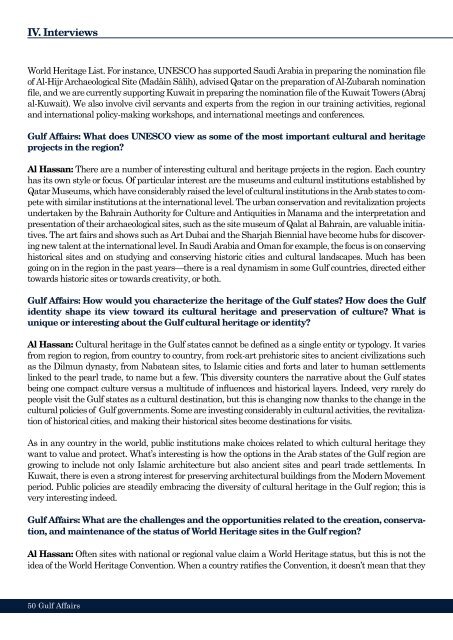Create successful ePaper yourself
Turn your PDF publications into a flip-book with our unique Google optimized e-Paper software.
IV. Interviews<br />
World Heritage List. For instance, UNESCO has supported Saudi Arabia in preparing the nomination file<br />
of Al-Hijr Archaeological Site (Madâin Sâlih), advised Qatar on the preparation of Al-Zubarah nomination<br />
file, and we are currently supporting Kuwait in preparing the nomination file of the Kuwait Towers (Abraj<br />
al-Kuwait). We also involve civil servants and experts from the region in our training activities, regional<br />
and international policy-making workshops, and international meetings and conferences.<br />
Gulf Affairs: What does UNESCO view as some of the most important cultural and heritage<br />
projects in the region?<br />
Al Hassan: There are a number of interesting cultural and heritage projects in the region. Each country<br />
has its own style or focus. Of particular interest are the museums and cultural institutions established by<br />
Qatar Museums, which have considerably raised the level of cultural institutions in the Arab states to compete<br />
with similar institutions at the international level. The urban conservation and revitalization projects<br />
undertaken by the Bahrain Authority for <strong>Culture</strong> and Antiquities in Manama and the interpretation and<br />
presentation of their archaeological sites, such as the site museum of Qalat al Bahrain, are valuable initiatives.<br />
The art fairs and shows such as Art Dubai and the Sharjah Biennial have become hubs for discovering<br />
new talent at the international level. In Saudi Arabia and Oman for example, the focus is on conserving<br />
historical sites and on studying and conserving historic cities and cultural landscapes. Much has been<br />
going on in the region in the past years—there is a real dynamism in some Gulf countries, directed either<br />
towards historic sites or towards creativity, or both.<br />
Gulf Affairs: How would you characterize the heritage of the Gulf states? How does the Gulf<br />
identity shape its view toward its cultural heritage and preservation of culture? What is<br />
unique or interesting about the Gulf cultural heritage or identity?<br />
Al Hassan: Cultural heritage in the Gulf states cannot be defined as a single entity or typology. It varies<br />
from region to region, from country to country, from rock-art prehistoric sites to ancient civilizations such<br />
as the Dilmun dynasty, from Nabatean sites, to Islamic cities and forts and later to human settlements<br />
linked to the pearl trade, to name but a few. This diversity counters the narrative about the Gulf states<br />
being one compact culture versus a multitude of influences and historical layers. Indeed, very rarely do<br />
people visit the Gulf states as a cultural destination, but this is changing now thanks to the change in the<br />
cultural policies of Gulf governments. Some are investing considerably in cultural activities, the revitalization<br />
of historical cities, and making their historical sites become destinations for visits.<br />
As in any country in the world, public institutions make choices related to which cultural heritage they<br />
want to value and protect. What’s interesting is how the options in the Arab states of the Gulf region are<br />
growing to include not only Islamic architecture but also ancient sites and pearl trade settlements. In<br />
Kuwait, there is even a strong interest for preserving architectural buildings from the Modern Movement<br />
period. Public policies are steadily embracing the diversity of cultural heritage in the Gulf region; this is<br />
very interesting indeed.<br />
Gulf Affairs: What are the challenges and the opportunities related to the creation, conservation,<br />
and maintenance of the status of World Heritage sites in the Gulf region?<br />
Al Hassan: Often sites with national or regional value claim a World Heritage status, but this is not the<br />
idea of the World Heritage Convention. When a country ratifies the Convention, it doesn’t mean that they<br />
50 Gulf Affairs


